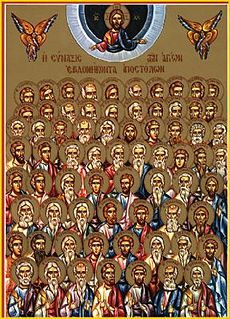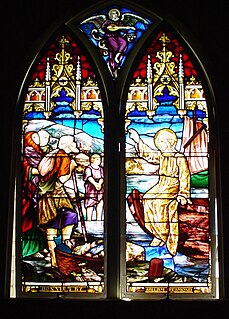
The seventy disciples or seventy-two disciples, known in the Eastern Christian traditions as the seventy apostles or seventy-twoapostles, were early emissaries of Jesus mentioned in the Gospel of Luke. The correct Greek terminology is evdomikonta (εβδομήκοντα) apostoli or evdomikonta mathetes.

Matthew 6:1 is the first verse of the sixth chapter of the Gospel of Matthew in the New Testament and is part of the Sermon on the Mount. This verse begins the discussion of how even good deeds can be done for the wrong reasons.
Matthew 10:23 is a verse in the tenth chapter of the Gospel of Matthew in the New Testament.
Matthew 10:42 is a verse in the tenth chapter of the Gospel of Matthew in the New Testament.

Matthew 10:13 is the thirteenth verse in the ninth chapter of the Gospel of Matthew in the New Testament.
Matthew 9:11 is a verse in the ninth chapter of the Gospel of Matthew in the New Testament.
Matthew 10:29 is a verse in the tenth chapter of the Gospel of Matthew in the New Testament.
Matthew 11:29 is the 29th verse in the eleventh chapter of the Gospel of Matthew in the New Testament.

Matthew 10:3 is the third verse in the ninth chapter of the Gospel of Matthew in the New Testament.
Matthew 8:27 is a verse in the eighth chapter of the Gospel of Matthew in the New Testament.

Matthew 10:9 is the ninth verse in the ninth chapter of the Gospel of Matthew in the New Testament.
Matthew 10:30 is a verse in the ninth chapter of the Gospel of Matthew in the New Testament.

Matthew 10:10 is the tenth verse in the ninth chapter of the Gospel of Matthew in the New Testament.

Matthew 10:32 is the 32nd verse in the ninth chapter of the Gospel of Matthew in the New Testament.
Matthew 10:22 is a verse in the tenth chapter of the Gospel of Matthew in the New Testament.

Matthew 10:25 is the 25th verse in the tenth chapter of the Gospel of Matthew in the New Testament.

Matthew 10:27 is the 27th verse in the ninth chapter of the Gospel of Matthew in the New Testament.
Matthew 12:27 is the 27th verse in the twelfth chapter of the Gospel of Matthew in the New Testament.
Matthew 12:28 is the 28th verse in the twelfth chapter of the Gospel of Matthew in the New Testament.
Matthew 15:3-6 is a set of verses in the fifteenth chapter of the Gospel of Matthew in the New Testament.








